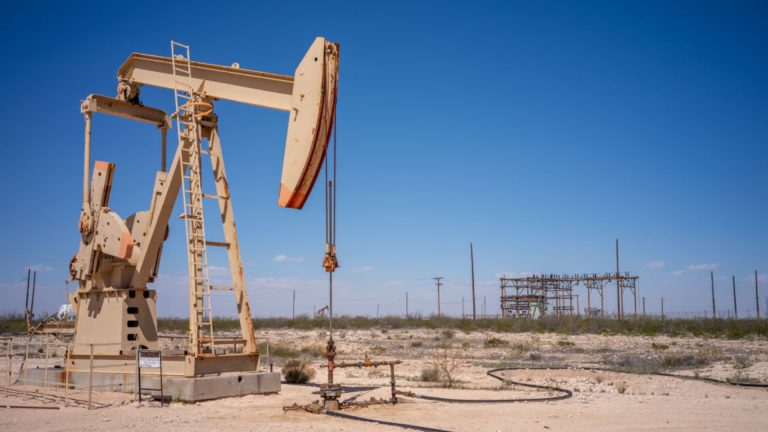U.S. crude prices fell for the fifth straight day Tuesday, but we remain committed to our lone oil-and-gas stock in Coterra Energy . West Texas Intermediate has been moving lower since its early April peak, with Tuesday bringing the U.S. oil benchmark to its lowest settle since Feb. 5, at $73.25 a barrel. Some of the declines may be because the geopolitical risk premium factored into the commodity is fading amid hopes for a cease-fire in the war in Gaza. More recently, Organization of the Petroleum Exporting Countries and its partners, collectively known as OPEC+, indicated over the weekend that some of its production cuts will begin to be phased out later this year, which Goldman Sachs called a “bearish surprise” for the market. There are also some concerns about a slowing U.S. economy contributing to the decline, given demand for oil is closely tied to economic activity. The drop in oil prices has implications for the economy and stocks overall. While a material slowing of the economy — basically, a hard-landing scenario — certainly would not be a great backdrop for the market, some slowing is exactly what investors want to see. As we’ve become painfully aware over the past few years, energy represents a major, unavoidable input cost for both the average consumer and companies paying for transportation and electricity. Elevated oil prices have, as a result, pressured discretionary spending and corporate margins. For that reason, any relief in energy prices will have the opposite effect — freeing up more money for consumers to spend away from the gas pump. Corporations, meanwhile, can see a boost to profit margins as their costs to make and ship products comes down. Throw in the potential for lower interest rates beginning as soon as later this year, and it all amounts to a pretty positive setup for equities. We’re looking for that sweet spot in economic growth that allows the Fed to cut interest rates while keeping unemployment low. If we get that, then we should see lower oil prices and sustained buying power along with a healthy environment for business investments. That’s goldilocks for the economy and the stock market, aside from the energy sector. CTRA YTD mountain Coterra’s year-to-date stock performance. And yet we still see reason to stick with Coterra Energy. In fact, one of the key reasons we like the company so much — its roughly equal exposure to oil and natural gas — has been on display lately. While oil has been pulling back, natural gas prices have rebounded from their steep sell-off to start the year, climbing about 23% over the past month. Coterra has the ability to shift production resources between oil and nat gas, based on whichever commodity offers the more favorable economics. In the first quarter of this year , that meant more of a focus on oil. Another reason to stick with Coterra: Deal activity has continued in the energy complex, the most recent of which being ConocoPhillips agreeing to buy Marathon Oil in a $17 billion all-stock transaction . To be sure, we don’t invest in companies based on takeover probabilities, but the industrywide trend toward consolidation — sparked by Exxon Mobil ‘s takeover of ex-Club name Pioneer Natural Resources in the fall —is hard to ignore. Indeed, analysts at Citigroup published a research note Tuesday exploring potential takeover targets for Devon Energy, another ex-Club oil stock. Coterra was among the three names analysts mentioned alongside Ovintiv and Permian Resources . Admittedly, the analysts don’t believe any of the three companies have a high chance of being bought by Devon or, in the case of Coterra, probably a merger of equals. Still, the note supports the idea that more deals could be announced in the future, which generally should be supportive of Coterra’s valuation multiple as competition declines. The bottom line: When we initially took on exposure to the energy market, we told investors that the positions needed to be partially viewed as a hedge on the rest of the portfolio. After all, that is what a well-diversified portfolio looks like — some parts have the ability to work well when others fall out of favor. If the economy holds in while energy prices and interest rates come down, Coterra’s stock could see some pressure while the rest of our portfolio benefits. That is how it’s supposed to work with a hedge. However, we still want to own shares because weaker commodity prices may be offset by the higher demand resulting from increased consumption and sustained economic growth, even if at a slower pace. It’s also possible geopolitical tensions could heat back up. Now layer in Coterra’s ability to swing resources between oil and natural gas, continued consolidation in the oil patch, and management’s strict financial discipline, and we come away with the view that the downside from here is limited. (Jim Cramer’s Charitable Trust is long CTRA. See here for a full list of the stocks.) As a subscriber to the CNBC Investing Club with Jim Cramer, you will receive a trade alert before Jim makes a trade. Jim waits 45 minutes after sending a trade alert before buying or selling a stock in his charitable trust’s portfolio. If Jim has talked about a stock on CNBC TV, he waits 72 hours after issuing the trade alert before executing the trade. THE ABOVE INVESTING CLUB INFORMATION IS SUBJECT TO OUR TERMS AND CONDITIONS AND PRIVACY POLICY , TOGETHER WITH OUR DISCLAIMER . NO FIDUCIARY OBLIGATION OR DUTY EXISTS, OR IS CREATED, BY VIRTUE OF YOUR RECEIPT OF ANY INFORMATION PROVIDED IN CONNECTION WITH THE INVESTING CLUB. NO SPECIFIC OUTCOME OR PROFIT IS GUARANTEED.
U.S. crude prices fell for the fifth straight day Tuesday, but we remain committed to our lone oil-and-gas stock in Coterra Energy.
Read the full article here









